Ray of Night
I half considered writing this revelation in the cinema of Nicholas Ray in the form of a love letter, but then thought twice of it. The pros to this approach were rooted in the possibility of using poetic phrases of praise and direct addressing of Mr. Ray - so personal are each of his visions that I feel them to come direct from the heart. So perfect are these subtle little pictures and so infused with a shadowy poeticism that a poetic little letter seemed apt, but Mr. Ray knows of this, of course. And the main purpose of this site, dear reader, is you. Well, okay, me too... but I'm aiming it outward.
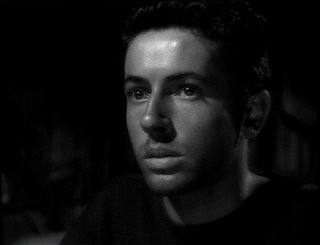 The American Cinematheque at the Egyptian is hosting a festival of Ray's films. The more obscure ones are sadly absent (the program even apologizes for elusive Lusty Men) but some of the grander titles (grand for Ray's delicateness, at least) fill the roster. The Quadruple bill which I attended on Saturday (which turned into a triple bill - you gotta eat sometime!) commenced with They Live By Night. Starring Farley Granger and Cathy O'Donnell as lovers on the lam. The film, like most of the evenings offerings, was a contrast of cruel criminality and the most breathtaking and nuanced depiction of blossoming affection. Ray's cameras don't merely render their sensitive subjects. They understand them. Regard the light which paints Miss O'Donnell's face and the soft focus on Granger's voluptuous lips. Though there is true crime and murder, in Ray's vision, the horrors are in their perpetrator's alienation from the outside world. Cathy isn't as much an accomplice, as they're not precisely criminals, but criminality is something that they rather accidentally stumbled upon.
The American Cinematheque at the Egyptian is hosting a festival of Ray's films. The more obscure ones are sadly absent (the program even apologizes for elusive Lusty Men) but some of the grander titles (grand for Ray's delicateness, at least) fill the roster. The Quadruple bill which I attended on Saturday (which turned into a triple bill - you gotta eat sometime!) commenced with They Live By Night. Starring Farley Granger and Cathy O'Donnell as lovers on the lam. The film, like most of the evenings offerings, was a contrast of cruel criminality and the most breathtaking and nuanced depiction of blossoming affection. Ray's cameras don't merely render their sensitive subjects. They understand them. Regard the light which paints Miss O'Donnell's face and the soft focus on Granger's voluptuous lips. Though there is true crime and murder, in Ray's vision, the horrors are in their perpetrator's alienation from the outside world. Cathy isn't as much an accomplice, as they're not precisely criminals, but criminality is something that they rather accidentally stumbled upon.
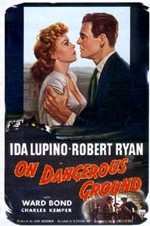 Even more than the rather straight-forward They Live By Night, On Dangerous Ground finds a film whose narrative potential is quite vast, yet prefers dashing that calculated potential to the wind for a more emotionally charged climax. In a narrative which more meanders than progresses, the film follows a slightly unwound cop from a slimy city, which, to this critic, echoed the Caligarian geometric chiaroscuro of the decade prior's 7th Victim, to an idyllic countryside where blood mars the white purity of its freshly fallen snow. It's equals parts Magnificent Obsession and Pickup on South Street, and the luxurious Ida Lupino lurks in a secluded, snow covered farm house.
Even more than the rather straight-forward They Live By Night, On Dangerous Ground finds a film whose narrative potential is quite vast, yet prefers dashing that calculated potential to the wind for a more emotionally charged climax. In a narrative which more meanders than progresses, the film follows a slightly unwound cop from a slimy city, which, to this critic, echoed the Caligarian geometric chiaroscuro of the decade prior's 7th Victim, to an idyllic countryside where blood mars the white purity of its freshly fallen snow. It's equals parts Magnificent Obsession and Pickup on South Street, and the luxurious Ida Lupino lurks in a secluded, snow covered farm house.
It's a crisper film than They Live By Night, but the close-ups are far more enamored with Miss Lupino. Even in the scene where an immaculate dribble of spit glides down her cheek, Lupino glows with a radiant confidence and beauty seldom rivaled by any actress, ever. And she's meant to be blind. But that's sort of beside the point. The point, here, is the film's disinterest in anything but her swoon. Which is something I understand, entirely.
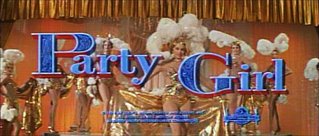 And then the glitzy pageatnry of Party Girl slaps the black and white 1.37:1 ratio frame with its insane Metrocolor Cinemascope and Cyd Charisse's elaborate dance numbers. A story, which fools initially with its Showgirls-like backstage harlotry, becomes a 30s gangster flick with a lead who seems to have been lifted straight from one of Dietrich's efforts with Von Sternberg. Peppering the stool pidgeon narrative are the marvelous dresses which miss Charisse dons with pride.
And then the glitzy pageatnry of Party Girl slaps the black and white 1.37:1 ratio frame with its insane Metrocolor Cinemascope and Cyd Charisse's elaborate dance numbers. A story, which fools initially with its Showgirls-like backstage harlotry, becomes a 30s gangster flick with a lead who seems to have been lifted straight from one of Dietrich's efforts with Von Sternberg. Peppering the stool pidgeon narrative are the marvelous dresses which miss Charisse dons with pride.
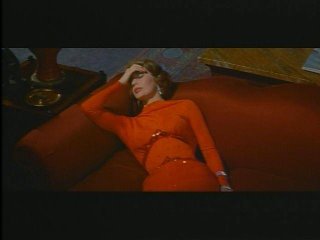 Being no expert on the men with guns genre, I can only speak to its relation with Miss Charisse, who all but parts ways with the cast halfway through, only to reemerge as a plot device. Her earlier moments of sexual prowess are noteworthy for her composure and the verboseness of the Cinemascope gangster film (where the frame much greater sense during Charisse's too-few dance sequences) is quite well calculated. The film, as a piece of celluloid in a theater - in all of its lavish vastness - is a sensation to behold. I wonder what the translation of such a film on a smaller screen might behold. I'm none too sure that it would hold up as well. But, since it's not on DVD, I guess we'll never know.
Being no expert on the men with guns genre, I can only speak to its relation with Miss Charisse, who all but parts ways with the cast halfway through, only to reemerge as a plot device. Her earlier moments of sexual prowess are noteworthy for her composure and the verboseness of the Cinemascope gangster film (where the frame much greater sense during Charisse's too-few dance sequences) is quite well calculated. The film, as a piece of celluloid in a theater - in all of its lavish vastness - is a sensation to behold. I wonder what the translation of such a film on a smaller screen might behold. I'm none too sure that it would hold up as well. But, since it's not on DVD, I guess we'll never know.
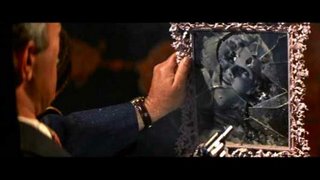

0 Comments:
Post a Comment
<< Home